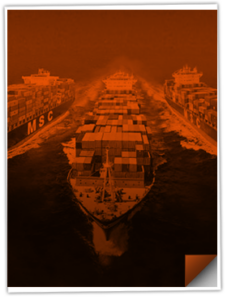Featured Headlines:
International Community in Mad Rush to Crush Russia
Imports of Avocados from Mexico Resume
Jazzy Chassis Pool Fuels Access
Air Space Spaced Out Over War Zone
International Community in Mad Rush to Crush Russia
- The US, UK, EU, along with Japan, Australia, Switzerland, New Zealand and Canada, announced additional sanctions and other restrictions against Russia this week, standing in a united front against the invasion of Ukraine.
- The new restrictions add more individuals to global watchlists, expand export controls, and further isolate the Russian financial system. The sanctions mainly target Russian elites, banks, oil refining industry, and high-tech and military exports.
- You can read more about these actions and what they entail here.
Imports of Avocados from Mexico Resume
- The Animal and Plant Inspection Service (APHIS) announced that inspections and imports of fresh avocados from Mexico have resumed.
- The agency previously suspended avocado export program operations in Michoacan— the only Mexican state currently authorized to export avocados— on February 11th, after a threatening phone call was received by an APHIS official while conducting an inspection.
- Click here to view the official APHIS notice.
Jazzy Chassis Pool Fuels Access
- The ports authority of Georgia, North Carolina, and Jacksonville have partnered with Consolidated Chassis Management (CCM) and the Ocean Carrier Equipment Management Association (OCEMA) to create the South Atlantic Chassis Pool 3.0 (SACP).
- The single provider pool, set to launch in October 2023, will provide access to 60,000 chassis in 75 locations across the Southeast US.
- The “gray” pool will serve port users, truckers, ocean carriers, and beneficial cargo owners; the move is designed to alleviate port congestion along the South Atlantic.
- While the assets will initially be owned by OCEMA, CCM will manage the pool and purchase new chassis for SACP, with the three ports authority having forward-looking influence on the future of the pool.
Domestic Pit Stop Back Drop
- Severe chassis shortages in Charleston, Savannah, Philadelphia, and New York are lengthening outbound rail transit times from these ports by as long as a week.
- 2022 US contract rate levels for Less Than Truckloads (LTL) are up over 12%, up more than 10% for intermodal rail moves, and up over 8% for truckload contracts.
- Due to steamship line “network needs”, inland point intermodal (IPI) moves are down over 30% year-over-year from California, Nevada, and Arizona. IPI moves from Seattle and Tacoma are down more than 28%.
- With transloading booming and expanding beyond seaports, major Full Truckload (FTL) providers have increased their orderbook of 53’ trailers by an astounding 20% since 2020.
- The Union Pacific Railroad (UP) has announced surcharges from $1500 to $4000 per container for all moves from the West Coast using UP-owned equipment.
The Global Grab Bag
- The World Trade Organization’s (WTO) chief economist, Robert Koopman, indicated that today’s supply chain congestion is 67-75% connected to consumer demand rather than steamship supply. He expects demand for goods to markedly decrease in the next three months.
- Citing commercial risks, six of the world’s largest ocean carriers have ceased port calls to and from Russia. This represents 62% of containerized capacity, and more carriers are expected to follow suit. Similarly, tanker operators have begun to pull out of Russian operations.
- Global air cargo volumes increased nearly 19% in 2021 vs 2020; this record volume was also 7% higher than 2019 (pre-pandemic).
- The European Commission is considering a directive that will require larger firms operating in or based in the EU to “identify and prevent, end, or mitigate” human rights abuses and negative environmental consequences throughout their supply chains. Industry pundits in the US are watching this closely since many American firms do business in Europe, and US policymakers may well look at this initiative as a model for future supply chain regulation.
Arms Get Leg Up in Congress
- Over the last year, the US has committed $1B to Ukraine in security assistance.
- Today, the US and Western allies are being called upon to provide anti-tank and anti-aircraft weapons to Ukraine as it defends its people and assets from Russia.
- In a US House of Representatives Armed Services Committee hearing, Assistant Secretary of State Jessica Lewis said that the US must provide “urgently needed ammunition and Javelin anti-tank missiles” to Ukraine while simultaneously authorizing transfers of US-origin military technology from NATO allies.
- Last weekend, the Biden Administration approved a $350 million transfer of US weapons to Ukraine including anti-aircraft munitions, body armor, small arms, and other munitions.
Port-pourri
- Vessel waiting time has reached an average of 36 days for both Long Beach and Los Angeles. High import dwell times, labor shortages, and yard congestion have hampered overall efficiencies.
- Similarly, Charleston, Houston, Norfolk, and Oakland all have average vessel waiting times above 10 days.
- As ocean carriers slow steam to save fuel before a long wait in LA, average transit times from base ports in China have reached an unfathomable 38 days; this is 36% longer than in November 2021.
- Steamship executives at TPM 2022 warned the shipping community to prepare for a “bumpy ride” for negotiations between the West Coast dockworkers union (ILWU) and ocean carriers/maritime terminals. The contract expires on July 1.
Air Space Spaced Out Over War Zone
- Commercial flights are avoiding Ukraine, large portions of western Russia and southern Belarus. Flight maps show a massive “desert” of flights over the war zone.
- Nearly 100% of Asia-Europe air cargo services have been impacted in some fashion.
- Complicating the global air supply chain, Russia has banned all British planes from their air space, and most insiders believe this is just the beginning of sanctions on the West and on Russia.



